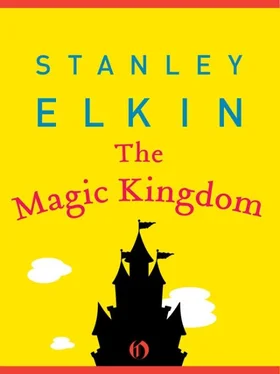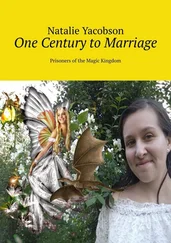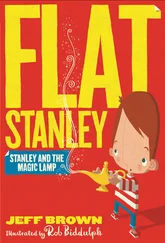Stanley Elkin - The Magic Kingdom
Здесь есть возможность читать онлайн «Stanley Elkin - The Magic Kingdom» весь текст электронной книги совершенно бесплатно (целиком полную версию без сокращений). В некоторых случаях можно слушать аудио, скачать через торрент в формате fb2 и присутствует краткое содержание. Год выпуска: 2010, Издательство: Open Road Integrated Media LLC, Жанр: Современная проза, на английском языке. Описание произведения, (предисловие) а так же отзывы посетителей доступны на портале библиотеки ЛибКат.
- Название:The Magic Kingdom
- Автор:
- Издательство:Open Road Integrated Media LLC
- Жанр:
- Год:2010
- ISBN:нет данных
- Рейтинг книги:5 / 5. Голосов: 1
-
Избранное:Добавить в избранное
- Отзывы:
-
Ваша оценка:
- 100
- 1
- 2
- 3
- 4
- 5
The Magic Kingdom: краткое содержание, описание и аннотация
Предлагаем к чтению аннотацию, описание, краткое содержание или предисловие (зависит от того, что написал сам автор книги «The Magic Kingdom»). Если вы не нашли необходимую информацию о книге — напишите в комментариях, мы постараемся отыскать её.
The Magic Kingdom — читать онлайн бесплатно полную книгу (весь текст) целиком
Ниже представлен текст книги, разбитый по страницам. Система сохранения места последней прочитанной страницы, позволяет с удобством читать онлайн бесплатно книгу «The Magic Kingdom», без необходимости каждый раз заново искать на чём Вы остановились. Поставьте закладку, и сможете в любой момент перейти на страницу, на которой закончили чтение.
Интервал:
Закладка:
And now it is the Queen of England who does not have his attention. She taps a Scrabble tile lightly against the game board.
“Oh,” Bale startles. “Forgive me, Majesty.” And begins (not without wondering whether it isn’t being in a palace which has somehow caused his — their — lapse, the trance, the magic narcotics of his frozen animation: Has a century passed? Is Elizabeth still queen? Has the boy come into his inheritance by now? Enjoyed his tenure and relinquished it to a child itself no longer a child who for his part has handed over the depleted yet intact privilege of his title to the next in line in the orderly take-turn, marathon sequences of life and death? Is the kid ancestorized now, his portrait in uniform hung in a hall?) to tell his schemes.
“When I realized,” he says, interrupting himself, overriding his improbable, inopportune parentheticals, “we had pretty well come to the limits of my son’s medical options, I began to question whether he had been justly served. My wife, Ginny, and I had embarked on this search for a cure for what we’d been told at the outset was incurable. After the docs had conferred, after the second opinions, after the tests and operations and experiments, I began to see that Liam was really no better off than when his difficulties had been first confirmed in those initial interviews with the doctors in that first surgery of the National Health. Worse off, really. For by now the invasive procedures had been introduced. They beat my kid up, Your Royal Highness. With the best will in the world they worked him over. They took off his hair with their toxins and gave his liver third-degree burns. They softened his bones like modeling clay and grew little ulcers in his gut. They turned his blood into dishwater. They caused him such pain, Monarch. It’s not as if they didn’t warn us about the side effects. Every other word out of their faces was side effects: diarrhea, nausea, depression, and drowsiness”—and has some idea where his vagrant notion of a spell had come from just now—“weakness, fatigue. And everything with his parents’ permission. All, all of it approved at the outset, Sovereign, the sacrifice added to his sickness like a cover charge, risk built into his bill like the V.A.T. We were dippy for risk, spellbound — enchanted, I mean. Desperation whips up courage. It clothes consequence and dresses the bogeyman in high fashion. Oh, I think we were mad. Into science like astrology. Beside ourselves as gamblers doubling up on their bets. You’re ruler here, Ma’am. Tell me, is there a law of diminished returns? Should you hope with your head? Wouldn’t we have been better off if we’d boarded the ship for the sunny isles? Chosen the course of the stubborn old bastards, the ones who stuff pleasure into their winding sheets like a sort of Egyptians — port and cigars and a pinch for the nurses that doesn’t just elevate blood pressure but positively launches it? Hey, the only thing my kid never lost was his looks. Those he had on his deathbed. You saw his pictures, you followed his case. Did he go like a goner? Did he look like one? Teenage girls wanted his autograph. He was dreamy as a rock star, they said. Wouldn’t we have been better off to have given him a cram course in debauchery? Whatever it took? The rarest dishes and the richest sauces? Ardor, toys, and all the final cigarettes and secret wishes of his imagination?
“Well. You see what I mean. Where we went wrong. We never rewarded him for his death. He should have lived like a crown prince, Queen. We should have sent him off to hunt in a red coat. We should have brought him to opera and sat him in boxes. We should have hijacked the sweet shoppe and turned him loose at the fair. We ought have sent him on picnics with hampers of ice cream. We should have ground his teeth down on scones and flan and ruined his eyes on the telly. We should have sent him to sleep past his bedtime. We should have burned him out on his life, Dynast. We should have bored him to death.”
“Oh, I say,” the Queen says, clutching her purse. Bale knows that the woman — he recalls her odd patience with weather from photographs, news clips, her jungle and rain-forest tranquillity, her snowstorm serenity, her comfort in climate — has seen it all but wonders how much she’s heard. He senses her alarm, is alarmed himself. This is not the way he presents himself to patrons. With financiers he is reserved, refined as their boardrooms, sedate as a bank. Only to his suzerain has he said these things. Nor, till now, has he given much thought to his distinction, all that’s been granted him: his private audience with his Queen, his presence in the strange, off-limits room. He’s never seen it in photographs and cannot now remember how he reached it, has only a vague memory of having climbed a staircase, come down a corridor, rather, he imagines, like the corridors in First Class on good steamships, a queer notion of being pulled along. Yes, he thinks, in the wake of the beautiful young woman, sluiced as wood, debris, sucked and maelstrom’d, shipwrecked, beached. Even the sight of his Queen’s pocketbook strikes him as not only the most informal thing he has ever seen but the most intimate as well. I saw her cheat, he thinks, then wonders, My God, did that set me off? I am mad, I am. I’m lucky she don’t call the coppers. Which, he sees now, is not quite the case. Footmen have appeared. They stand along the walls in their livery, their rococo chests puffed as the breasts of birds. Bale is certain they have been signaled, high-signed. Or perhaps the room is wired.
Sending his own signals, Eddy moves his shoulder slightly forward, shifting the arm with the mourning band, favoring it like a man with a game leg. He actually touches the black cloth. It is some private rigmarole, reflexive but loaded with a meaning he hopes will carry across the abandoned game board. He is not calling attention to his loss — tears form in his eyes, choke his throat, but this is because, like Ginny, whose taxi had been paid for with the last bit of Liam’s cure money, his armband has been purchased with (what?) the last of the mourner money — but to his vulnerability, his madman’s amiable harmlessness. He holds the black armband as if it were a white flag. And Elizabeth II understands. She smiles. Even the footmen seem to have uncovered his intentions. Invisibly, they seem to relax, expel air from their chests, breathe normally as other men.
“Yes?” she says, encouraging him.
“Over two hundred children can be expected to die of rare terminal diseases in Great Britain this year.”
“Oh, my,” says the Queen.
“You should understand that nothing further can be done for them,” Bale says, and he is recovered now, as decorous as if he is addressing a tycoon, a newspaper magnate. “For many of them, additional treatment would make them even more uncomfortable than they already are and only hasten the day of reckoning. In several cases their therapies have already stopped or will shortly. This is at their parents’ request or, in certain instances, at the request of the patients themselves. Their physicians have placed them on a sort of minimum maintenance: restricted diets, courses of high-potency vitamin injections, carefully monitored sleep regimens, even, when the discomfort becomes too great, narcotics on demand.”
“Les pauvres!”
Bale pauses. A peculiar thing has happened. He discovers that, at the crunch, he is unable to bring his argument round, that the kingdom’s foremost beggar, a man who has passed the hat among the nation’s leading industrialists and press lords and brought his case to the public not only through those shameless exclusives he sold but who, in those early days of his son’s illness, even climbed soapboxes in Hyde Park Corner and accepted Liam’s weight from Ginny, handing the child up to him at the end of his spiel as if the boy were conclusive, telling evidence in a legal proceeding, and who on one occasion actually walked along beside the buskers working the crowds in London’s theater district, Liam’s sad legend printed carefully across a sandwich board — this man is suddenly and quite inexplicably mute in the presence of a woman who, to judge from her assenting clucks and royal coos, is already sympathetic, predisposed toward the children who are now his cause. Perhaps he feels himself an intruder, inhibited by the wealth she represents, the difference her sympathies could make. Perhaps he is having second thoughts — indecisive at the last moment as a child choosing which chocolate to take from a box. Perhaps that’s it, that he’s caught among need’s swerving priorities, its competing demands on good men. Or that what he feels are the once- burned-twice-cautious misgivings of the wish-privileged in tales, and what he’s searching for is precise language, seeking to clause request in legalese, to seal it in the metric measurements of ironclad engagement. (But Bale knows. He is frozen by the peculiar kicks of juxtaposition, the odd sense he has always had of misalliance, incongruence, all the thrilling, discrepant mysteries and asymmetries of disrupt geometry. Once, before Liam had become ill, he and Ginny had left the child with an aunt to go on holiday with friends to the French Riviera. In Nice, quite by accident, they had come upon one of the nude beaches. “When in France…” his friend’s wife had said and removed the halter of her bathing suit. He had known the woman for years and, though she had always been attractive, he could not recall ever having thought about her sexually. Afterward, back in London, he could not look at her without remembering how she had appeared to him on that beach in Nice. Nor was he particularly aroused at the time. What he subsequently could not forget was that he had seen his friend’s wife’s breasts. He had never touched her, yet he could not get the incident out of his mind, and a part of him believed, and believes still, that he had somehow cuckolded the husband. What he felt, God help him, was a sort of pride. Another time, before he ever met Ginny, he had lived for a while with a girl named Ruth. They’d led a placid, almost deferential life together, each conveying to the other a wish to please. They never argued; were, for the six or seven months they’d been together, completely at ease, agreeable as twins. Only once, when a package they’d been expecting arrived at the flat, did they come anywhere close to quarreling. Ruth had gone to the door to accept the delivery. “Look, Eddy,” she said coming into the lounge, “the bed lamp from Heal’s, I think.” Bale took the carefully wrapped package and began to tug at the cord which bound it. It was strong stuff and he was having difficulty. “I’d better get a knife,” he said and got up from the couch on which he’d been sitting and started toward the kitchen. “Oh, don’t bother, luv,” Ruth said, “I’ll manage.” He turned to look. The tough cord snapped in her hands like a biscuit. “How’d you do that?” Bale asked. “Look,” she said, “it’s the lamp, all right, but the nits have sent us the wrong color. This one is green.” “How’d you do that?” Bale repeated. “Do what?” “Break the cord like that.” “Well, I don’t know. I guess I just pulled extra hard.” He took up the cord from where it lay on the floor and wrapped it around his hands. He couldn’t break it. “You’re trying to jerk it,” Ruth said. “Just pull. Here, see?” The cord seemed to stretch like elastic. She broke it effortlessly. They’d never argued, never fought. Without thinking about what he was doing, Eddy reached out with his open palm and tried to slap her. Instinctively she caught his hand and forced it down. She’s stronger than me, Bale thought. It’s not even a goddamn contest. Afterward it was Ruth who was embarrassed. “I’ll make us some tea,” she said. When she returned with the tea he wouldn’t drink it, and though neither ever alluded to the incident, Eddy was never again comfortable with her. It was the disparity, the misalliance, his nervous apprehension of her great physical strength, which he found at once threatening and compelling and with which he had become strangely obsessed, that made him move out. He was ashamed of himself, repelled by his new attraction for her.
Читать дальшеИнтервал:
Закладка:
Похожие книги на «The Magic Kingdom»
Представляем Вашему вниманию похожие книги на «The Magic Kingdom» списком для выбора. Мы отобрали схожую по названию и смыслу литературу в надежде предоставить читателям больше вариантов отыскать новые, интересные, ещё непрочитанные произведения.
Обсуждение, отзывы о книге «The Magic Kingdom» и просто собственные мнения читателей. Оставьте ваши комментарии, напишите, что Вы думаете о произведении, его смысле или главных героях. Укажите что конкретно понравилось, а что нет, и почему Вы так считаете.












